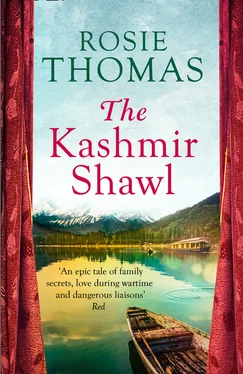1 ...7 8 9 11 12 13 ...22 The salesman took her purchases away to wrap, and on a sudden impulse Mair opened her rucksack and pulled the folded pouch from the innermost recess. Tinley watched curiously as she unfolded her grandmother’s shawl and gently spread it on the shop’s plain wooden counter. The colours of water and blossom made a pool of brilliance in the subdued light of the shop. The goods on the shelves appeared suddenly drab and coarse in comparison. Tinley gave a sharp sniff as he bent over to examine the shawl more closely, and the salesman swung round to take a look.
‘Can you tell me anything about this?’ Mair asked.
Tinley picked up a small hand lens from behind the counter and minutely examined the weave, running his fingers over the embroidery before flipping the fabric to examine the reverse. He traced the outlines of the paisley shapes and peered even more closely through his lens at one corner of the piece.
‘This is Kashmiri work,’ he said. ‘Kani weaving. We don’t do this here in Ladakh.’
The salesman said something to him.
‘You are selling it?’ Tinley casually enquired.
‘No. Definitely, no. It belonged to my grandmother. I am … just trying to find out something about the shawl’s history, and maybe through that a little about my grandmother. I never knew her, you see.’
Tinley put aside his lens and straightened up. ‘Then you must go over the mountains to the Vale of Kashmir,’ he said.
‘I think my grandparents were here in Leh, though. During the 1940s. My grandfather was a Christian missionary.’
‘A Catholic? Moravians?’
‘No. He was Welsh, a Presbyterian.’
Tinley shook his head, shrugging. This clearly meant nothing to him. ‘The Europeans came, not many stayed. They opened some clinics and founded schools for children and for that we owe them a debt.’ The unspoken rider was that for other things the missionaries had attempted, presumably the work of religious conversion, less gratitude was due.
Mair said, ‘I wanted to take a look at the European graveyard here, but the gates are always locked and I can’t find out who has the key.’
Tinley grinned, showing good teeth, and pushed his cap to an angle. He spoke rapidly to the storekeeper and they both laughed.
‘That’s easy. Tsering, my friend here, his uncle is the caretaker.’
The two men exchanged more information and Tinley told Mair that if she came back to the shop tomorrow, perhaps at three o’clock, the uncle would bring the key and take her to visit the graveyard.
She thanked them both and promised she would be there promptly. She began to fold the shawl again, but Tinley touched her wrist. ‘You have seen this?’ he asked, pointing to one corner of it. He put the lens into her hand, and she leant over to see what she hadn’t noticed before. There was a tiny embroidered symbol, like a stylised butterfly or perhaps the initials BB, with the first letter reversed, and next to it another indecipherable mark. ‘What is it?’
‘It is the maker’s signature, and the numbers “42”, which is perhaps the date of completion. It is a fine piece, and it would have taken many months, even years, for the craftsman to weave and then embroider. Probably it was made for a bride, as a wedding shawl for her to take with her to her husband’s home.’
For Grandmother Nerys Watkins, as a gift from her husband the Welsh Presbyterian missionary? Mair thought the shawl was far too opulent for that. Nothing she had learnt about her grandparents’ circumstances or their restrained faith matched its rarity and value. The mystery seemed only to deepen.
She put the new shawls into her bag with the precious old one, thanked the shopkeeper, and repeated that she would be back at three the next day.
Tinley smiled broadly. ‘You must be wearing your new pashmina. The cold weather is coming. Winter is early for us this year.’
As she walked through the old town the next afternoon, she saw how the place was turning in on itself under a bitter wind scything down off the mountain ice fields. She could smell snow in the air, as Tinley had predicted, and she was glad of the warmth of her muted brown shawl round her throat. Most of the house windows were now protected by old wooden shutters, and almost every roof towered with bundles of wood and stored animal fodder. There were fewer people about in the bazaar and she passed only one or two Westerners. In another week or two the last of the cafés and guesthouses would be closed, the summer migrant workers would head down to the beaches and hotels of Goa for the winter season, and Leh would sink into its winter isolation as the snow piled up on the passes. She thought of the Beckers, and wondered how they were coping in their tent in this cold weather.
At the showroom there was, of course, no sign of the uncle with the elusive key. Tsering the shopkeeper waved his hand at her impatience. He wanted to show her a new consignment of shawls, just arrived from the finisher. They drank masala chai and nibbled almonds and dried apricots as Mair admired the wares. She was learning that the ritualised exchanges of buyer and seller must take place even though they both knew that money and shawl were not going to change hands today.
After a pleasant half-hour, the door that led to the weavers’ studio clicked open. A tiny, ancient man in a fur cap and felt boots bound with strips of leather tottered on the threshold.
‘My uncle Sonam.’ Tsering beamed, putting a heavy arm over his shoulder. ‘My grandmother brother.’
Mair shook hands with the venerable figure, thinking that it was hardly surprising he didn’t spend much time caretaking. He looked too old to do anything except sit and doze in an armchair.
‘Good afternoon, Sonam-le,’ she said, giving him what she had learnt was the polite honorific. The old man darted a bright-eyed appraising look at her. He spoke in an undertone to Tsering and jerked his thumb towards the shop door.
With alacrity Tsering pulled on his Adidas jacket. ‘We’ll go,’ he said.
‘You’re going to leave the shop?’
‘My uncle does not speak English. Anyway,’ he shrugged and spread his hands, his face creasing, ‘I do not see any customer.’
He locked the door behind them and the three of them set off, Sonam’s long, belted tunic swishing around his ankles and his fur cap bobbing as they crossed the bazaar. He could move surprisingly fast. Within minutes they had reached the familiar locked gates of the European cemetery. Sonam reached inside his layers of clothing, rummaged for a moment, and withdrew a huge key. The gates at last swung open and Mair passed through, under the gaunt trees and between the crosses and headstones. The ground was covered with fallen leaves, their buttery gold already brown and lifeless. The cold stung her cheeks.
‘What are you looking for?’ Tsering asked.
Mair tried to interpret the German inscription on the nearest stone. ‘I don’t know,’ she confessed.
To her relief, the two men retreated to a small green lean-to placed against a sheltered wall. She wandered along the haphazard rows. There were several tiny graves, one with a stone that read simply ‘Josephine, aged 7 months’. She tried to imagine how European women so far from home had struggled to look after their children in this remote place, and how they must often have prayed in vain.
She came to one small group of headstones bearing Welsh names, the Williamses and Thomases and Joneses of her own home valley, who could only have belonged to the Presbyterian mission. She took out her notebook and copied down the names and dates to look up in Hope and the Glory of God next time she had access to the Internet. She recognised one line of Welsh that was utterly familiar because she had seen it most recently in the graveyard at home, engraved on a stone just a few feet from her mother and father’s. Hedd perffaith hedd. Peace, perfect peace.
Читать дальше












